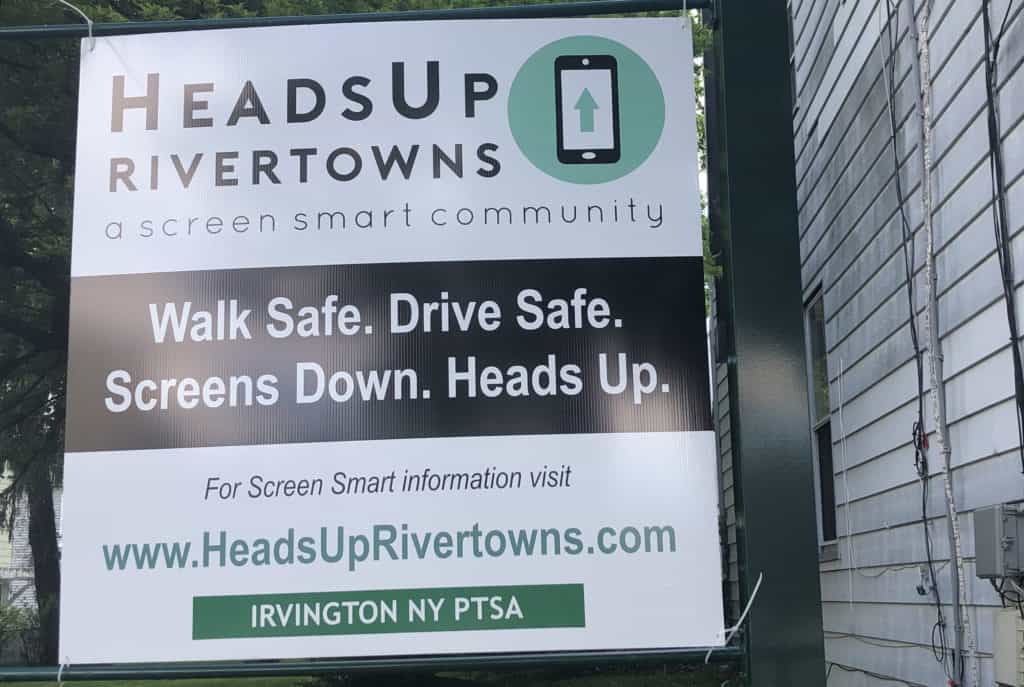
By Dan Murphy
A group of concerned parents in the Westchester Rivertowns of Hastings, Dobbs Ferry, Irvington, Greenbugh, Tarrytown and Sleepy Hollow, did something that almost every parent in the county has wanted to do with their children; get their kids off their cell phones during meals, schools, and with lower frequency overall.
A group of parents formed a committee called HeadsUpRivertowns, to advocate for screen smart policies in our school and to educate and support families in our communities about the effects of digital media. “Let’s starts the conversation. Let’s review the research, talk to our kids and each other, and figure out what makes sense for our families. Let’s get our heads up from our screens and work together to be a screen smart community,” states the website—headsuprivertowns.com.
This year at Irvington Middle School, students will put away their phones before school begins and keep them off until the end of the day – every day! “We’re excited about the idea that kids will have lunch time to actually talk and socialize and play as opposed to sitting in tandem at the lunch table on their cellphones, and in the classroom they won’t be distracted by the other things the cellphone brings into the classroom,” said Allison Waguespack one of the founders of HeadsUpRivertowns, which is supporting this effort at school and is happy for the actions of the Irvington Board of Education to make it happen.
Irvington Middle School Principal David Sottile said as an added incentive, if students turn off their phones, they will have the use of a brand new laptop to use in school for school purposes, during the school day.
All of us can agree that both children and adults use their cell phone far too much. Or is that under debate. Here’s 5 THINGS YOU MIGHT NOT KNOW ABOUT CHILDREN AND TECHNOLOGY
1. The average 8-10 year old spends approx 8 hours per day on various screens, including television, phones, tablets, and computers. This includes screen time in the classroom, on playdates, and at home. 45% of teenagers describe themselves as being online “almost constantly.” (Pew Research Center)
2. Approximately 8.5% of children develop video game addiction. Children report not being able to stop thinking about their games, and often sneak off to play, even waking up in the middle of the night to play. Video game addiction harms school performance, friendships and family relationships. (Dr. Douglas Gentile, leading researcher on video game addiction)
3. Researchers at the London School of Economics found that 16 year old student test scores increased by 6.4% after phones were banned in schools
4. In a study at the University of Texas Austin, the mere presence of a person’s smartphone either on a desk or in a bag nearby was shown to reduce the brain’s cognitive capacity due to distraction.
5. Many tech leaders, including Bill Gates and Steve Jobs, didn’t let their children have phones until they were 14. (New York Times)
HeadsUp Rivertowns was created to bring awareness, education and support to encourage a screen smart community in the current and changing age of technology. So far, HeadsUP Rivertowns has begun their community conversation by sponsoring activities to make people think about the effects of smartphones, social media and gaming on our children and ourselves.
Their website, HeadsUPRivertowns.com writes, “We are raising our children in a time when technology is everywhere-in our homes, in our classrooms, in our kids hand when they walk home from school or get together with friends. While technology brings us many benefits, many parents have become concerned about the pervasive presence of technology in our kids lives.”
This group also encourages parents to determine when is the right time to introduce their kids to different types of technology, and for those parents who want to hold off on giving a cell phone to their child until they reach a certain age, HeadsUp Rivertowns offers information and support on smartphone alternatives.
One of Headsup Rivertowns good ideas is to hold a Grey for a Day event on the first Thursday of every month. On the 1st Thursday of every month, participants phones are grayscaled, which makes using it less addicting.
Reflecting with your children or family after you “go gray” with your phone can include
Questions to think about once you go Gray:
1. How did it feel to be Gray?
2. Did you use your phone less? Did you feel like you had more time?
3. If you play games on your phone, were they as fun in black and white?
4. If you use social media on your phone, did it change your experience?
5. Did you feel less distracted by your phone?
6. Did you do anything you wouldn’t normally have had time for?
7. If you switched back to color, how did it feel to go back?
“I have found Going Gray downright therapeutic. I already had tried out the custom of making an agreement with clients to place phones out of reach, turned over, turned off. And that has helped. While there does seem to be a direct relationship between proximity of cell phone and quality sessions, Going Gray operates on a deeper level so that I don’t feel nearly the level of energetic pull that drives me to feel compelled to be connected to the phone at all times,” said Kevin Miller, a parent and tutor from Tarrytown.
HeadsUpRivertowns also suggests Device Free Dinners as another resource that parents, or anyone can use to get some attentive time with their kids or loved ones. My family and other families in Westchester like to start with this time slot to try and go without phones during the weeknight dinner.
Allison Waguespack and Wendy Hart recently appeared on WVOX Radio 1460AM with Greenburgh Supervisor Paul Feiner to talk about the group that they formed with several Rivertowns parents that are serious about the negative affects of using your cell phone too much, be it for games, social media or other reason. Every Westchester parent should visit headsuprivertowns.com, or find them on Facebook, for the interesting stories and ideas that they give to try and help you pull back on someones’ cell phone use. Hopefully,, HeadsUpRivertowns can grow to HeadsUpWestchester.





